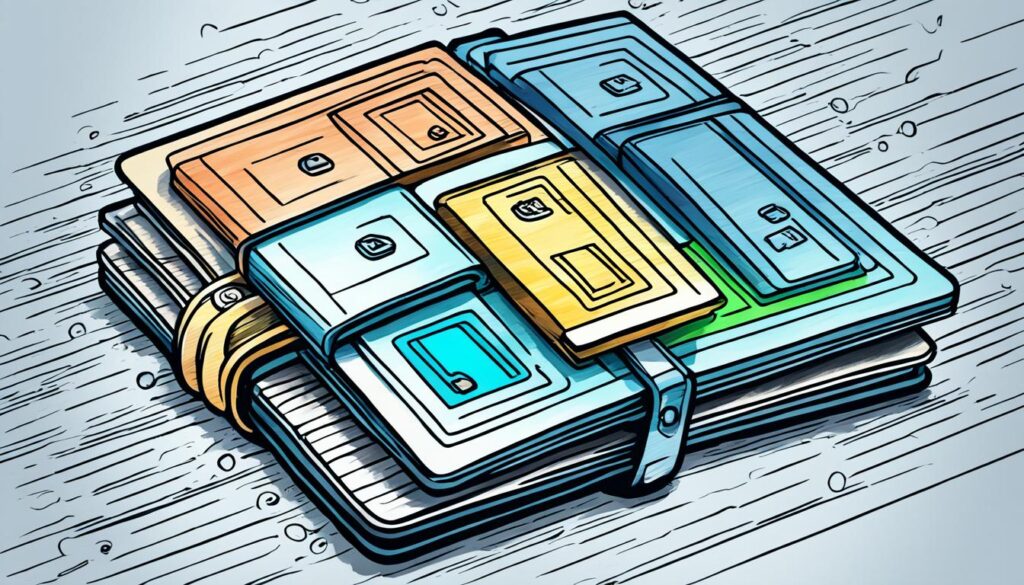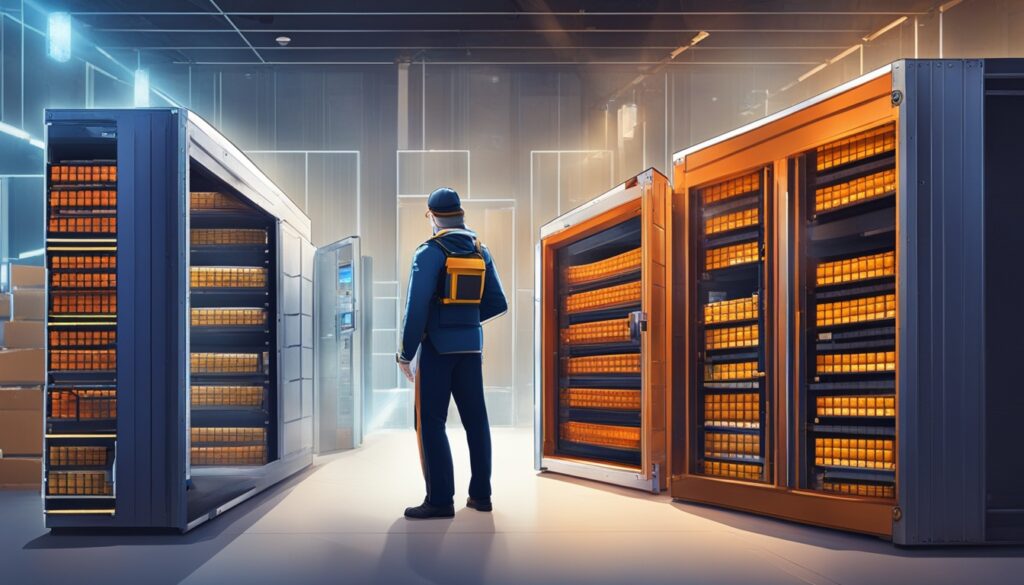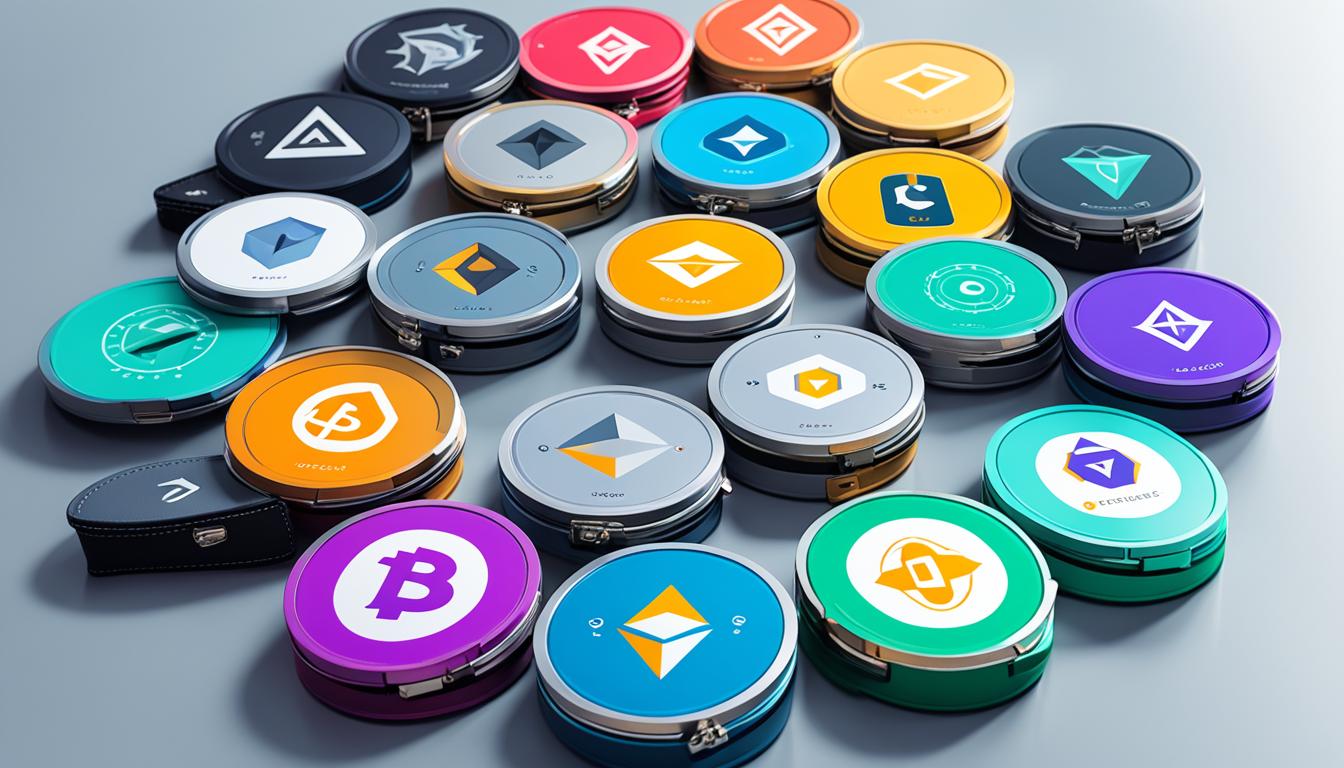In the world of cryptocurrencies, keeping your digital assets safe is key. As more people invest in altcoins, they face new challenges in protecting their money. They must deal with market ups and downs and complex security issues.
Cryptocurrency wallets let you access your digital money. They act as the link between you and your coins. There are different types of wallets, each with its own good and bad points. It’s important to know about altcoin wallets and how secure they are to keep your investment safe.
Wallets can be custodial, where a third party holds them, or non-custodial, where you keep your private keys. Choosing the right wallet affects how safe your altcoins are. Also, deciding between hot wallets (online) and cold wallets (offline) adds to the complexity.
Key Takeaways
- Cryptocurrency wallets come in various forms, including software, hardware, and paper wallets, each with its own security advantages and disadvantages.
- Understanding the differences between custodial and non-custodial wallets, as well as hot and cold wallets, is crucial for securing your altcoin investments.
- Proper wallet management, including the use of strong passwords, two-factor authentication, and regular software updates, can significantly enhance the security of your altcoin holdings.
- Diversifying your altcoin storage across different wallet types can provide an additional layer of protection against potential security breaches or losses.
- Staying informed about the latest altcoin security best practices and industry developments can help you navigate the challenges of the ever-evolving cryptocurrency landscape.
Enhance Altcoin Security with Multi-Signature Wallets: Step-by-Step Guide
In the world of cryptocurrency, keeping your altcoin safe is key. Multi-signature wallets are a great way to do this. They need more than one private key to make a transaction, which lowers the chance of unauthorized access. This makes it harder for hackers to get to your money.
Multi-signature wallets are great for people with a lot of cryptocurrency or who work with others on their assets. They spread control among several people. This means two or more must agree before a transaction can go through.
To start a multi-sig wallet, pick a provider like Coinbase Custody or BitGo. You’ll make several private keys and share them with others. When you want to make a transaction, everyone must use their key to say yes.
- Pick a multi-sig wallet provider that fits your needs and supports your cryptocurrencies.
- Make several private keys and share them safely with the people in your multi-sig setup.
- Decide how many signatures you need (like 2-of-3, 3-of-5) based on how secure you want it and what you need to do.
- Learn how to use the wallet’s interface and how to start and approve transactions.
- Keep an eye on the wallet’s activity and make sure everyone knows about any transactions or changes to the setup.
Using multi-signature wallets makes your altcoin safer and keeps your digital money safe from unauthorized access. This extra security is very important for people, businesses, and groups that use cryptocurrency.

Remember, keeping your altcoin wallet safe is very important. Multi-sig wallets are a strong way to protect against threats. By setting up and managing a multi-sig wallet, you can rest easy knowing your digital money is secure.
Cold Storage vs. Hot Wallets for Altcoins: A Comprehensive Security Comparison
Choosing between cold storage and hot wallets for your altcoins is a big decision. Each option has its own pros and cons in terms of security and ease of use.
Cold storage wallets, like hardware wallets, are top picks for keeping altcoins safe long-term. They keep your private keys offline, making them hard to hack. But, they can be harder to use for making transactions.
Hot wallets, found on computers, mobile devices, or online, are great for quick altcoin dealings. They’re easy to get to and fast for transactions. But, being online makes them more at risk for hackers.
When picking between cold and hot wallets, think about what you need and how much altcoins you have. For keeping a lot of altcoins safe for a long time, go with cold storage. For trading smaller amounts often, hot wallets might be better.
| Feature | Cold Storage Wallets | Hot Wallets |
|---|---|---|
| Security | Extremely secure, as private keys are stored offline | More vulnerable to online threats, such as hacking and theft |
| Convenience | Less convenient for frequent transactions, as they require physical access to the device | Highly convenient for frequent transactions, as they are always accessible online |
| Recommended Use | Large, long-term altcoin holdings | Smaller, more active altcoin trading |
Your choice between cold storage and hot wallets depends on what you need and how much risk you can take. Knowing the good and bad of each will help you make a smart choice for your digital money.

Unlock Altcoin Security: 7 Two-Factor Authentication Methods You Must Implement
Two-factor authentication (2FA) is key to keeping your altcoin wallet safe. It adds an extra step to make sure only you can get into your wallet, even if someone else has your password. This is crucial for protecting your digital money and keeping your altcoin safe.
Here are seven 2FA methods you should think about for your altcoin wallet:
- SMS-based 2FA: Get a one-time code on your phone that you need to enter to log in.
- Authenticator app-based 2FA: Use an app like Google Authenticator or Authy to get a temporary code for logging in.
- Hardware security key-based 2FA: Keep your wallet safe by using a physical security key, like a YubiKey, with your device.
- Biometric 2FA: Use your fingerprint, face, or other biometric data to prove who you are.
- Email-based 2FA: Get a code in your email that you must enter to log in to your wallet.
- Push notification-based 2FA: Your wallet will send a push notification to your phone, which you must okay to log in.
- SMS and Authenticator app-based 2FA: Use both SMS and app-based 2FA for even more security.
Using these 2FA methods can really boost your altcoin wallet’s security. It keeps your private key management, altcoin wallet encryption, and altcoin wallet backup safe from unauthorized access. By setting up these security steps, you can be sure your digital money is protected from threats.
“Enabling strong crypto practices, such as using unique passwords and staying alert against phishing, boosts a crypto account’s security when combined with 2FA.”
Backup and Secure Your Altcoin Wallet: Essential Guide for Protection
Keeping your altcoin safe is crucial in today’s fast-changing crypto world. It’s key to back up and secure your wallet and private keys well. This guide will show you how to keep your altcoin wallet and private keys safe.
- Write down your wallet’s seed phrase: Most altcoin wallets give you a 12 or 24-word seed phrase. This can help you get back into your wallet if it gets lost or damaged. Keep this altcoin seed phrase somewhere safe, like a fireproof safe or a safety deposit box.
- Encrypt your wallet: Many altcoin wallets let you encrypt your wallet with a strong password. This makes your private key management even more secure.
- Use a hardware wallet: Hardware wallets, like Ledger or Trezor, keep your private keys safe offline. They’re less likely to be hacked. These non-custodial wallets are the safest way to store your altcoins.
- Regularly backup your wallet: Back up your altcoin wallet often, either by making a backup file or writing down your seed phrase. This way, you can get your funds back if your device is lost, stolen, or broken. It helps keep your altcoin wallet backup and altcoin wallet recovery safe.
- Store backups in multiple locations: Have backup copies of your altcoin wallet in several safe places, like at home and in a safety deposit box. This helps protect against physical disasters or theft.
By doing these things, you can make sure your altcoin investments are safe for a long time. This gives you peace of mind and control over your digital money.
“Proper backup and security measures are the foundation of protecting your altcoin wealth in the long run.”
Decoding Encryption in Altcoin Wallet Security: Key Concepts Explained
Encryption is key to keeping your altcoin wallet secure. It shields your private keys and digital assets from unauthorized access. Knowing about encryption helps you choose the right security for your wallet:
- Public-key cryptography: Altcoin wallets use public-key cryptography. Each wallet has a public key for getting funds and a private key for sending and accessing funds.
- AES encryption: Many wallets use the Advanced Encryption Standard (AES) to protect the wallet file and private keys. This is a strong and common security step.
- Hashing: Wallets often use hashing, like SHA-256, to keep your private keys safe and check their integrity.
- Seed phrases: New wallets create mnemonic seed phrases, usually 12 or 24 words. These can help you get back into your wallet. Keep these seed phrases safe.
- Hardware wallet encryption: Hardware wallets, like Ledger and Trezor, have special secure parts. They store your private keys and encrypt all data, giving you extra protection.
Learning about these encryption methods helps you make smart choices for your wallet’s security. This way, you can keep your digital assets safe.
| Encryption Technique | Description |
|---|---|
| Public-key Cryptography | Each wallet has a unique public key for getting funds and a private key for sending and accessing funds. |
| AES Encryption | Many altcoin wallets use the Advanced Encryption Standard (AES) to encrypt the wallet file and private keys. |
| Hashing | Altcoin wallets often use hashing functions, such as SHA-256, to securely store and verify the integrity of private keys and other sensitive information. |
| Seed Phrases | Modern wallets generate mnemonic seed phrases that can be used to recover your wallet, and these seed phrases are also encrypted. |
| Hardware Wallet Encryption | Hardware wallets use dedicated secure elements to store private keys and encrypt all data on the device. |
“Understanding encryption concepts is crucial for ensuring the security of your altcoin wallet and protecting your digital assets.”
Hardware Wallets for Altcoins: Fortify Security with the Best Hardware Solutions
Hardware wallets are the top choice for keeping your altcoin safe. They store your private keys offline, making them hard to hack. Let’s look at some top hardware wallet options for securing your altcoins.
- Ledger Nano S/X: Ledger is a top name in hardware wallets. They offer secure storage for many altcoins like Ethereum and Litecoin. The Ledger Nano X supports over 5,500 cryptocurrencies.
- Trezor One/Model T: Trezor is known for its secure hardware wallets. They support a wide range of altcoins and have advanced security. The Trezor Model T can hold over 8,000 crypto assets.
- KeepKey: KeepKey is easy to use and supports many altcoins. It includes Bitcoin, Ethereum, and Litecoin.
- Coldcard: Coldcard is made for secure Bitcoin and altcoin storage. It has secure chips and tamper-proof casings.
Setting up a hardware wallet right is key. Make sure to store the recovery seed phrase safely and update the device regularly. This way, you keep your altcoin investments safe and sound.
“Hardware wallets are the most secure way to store your altcoins, as they keep your private keys offline and away from potential online threats.”
Your altcoin wallet’s security is crucial. Hardware wallets provide a strong way to protect your digital assets. Choose one of these top hardware wallets today for peace of mind.
Altcoin Wallet Recovery: Proven Tips and Best Practices for Retrieval
Losing access to your altcoin wallet can be stressful and costly. But, with the right steps, you can often recover your funds. Here are some proven tips and best practices for altcoin wallet recovery:
- Locate your wallet’s seed phrase: If you have written down your wallet’s 12 or 24-word seed phrase, you can use it to recover your wallet and regain access to your funds.
- Contact your wallet provider: If you don’t have your seed phrase, reach out to your wallet provider’s customer support team. They may be able to assist you in recovering your wallet, provided you can verify your identity and ownership.
- Avoid scams: Be wary of anyone claiming they can help you recover your wallet for a fee. This is often a scam, and you should never share your private keys with anyone.
- Consider a hardware wallet: If you’re worried about losing access to your wallet, consider using a hardware wallet like Ledger or Trezor. These devices provide an extra layer of security and make it easier to recover your funds if your device is lost or damaged.
- Regularly backup your wallet: Regularly backup your wallet by writing down your seed phrases and storing them in a secure location. This will ensure you can always recover your funds if needed.
Following these best practices can help you protect your altcoin investments. It also makes it easier to regain access to your non-custodial wallets if they are lost or stolen.
“Proper wallet management and regular backup of seed phrases can save you from the headache of altcoin wallet recovery.” – Crypto Enthusiast
Stay Safe from Phishing: Protecting Your Altcoin Wallet Against Attacks
Phishing attacks are a big threat to your altcoin wallet. They try to trick you into sharing your private keys or login info. This could put your digital money at risk. To keep your altcoin wallet safe, follow these important steps:
- Be wary of unsolicited messages: Don’t click on links or download attachments from unknown sources. They might be phishing attempts.
- Verify the legitimacy of websites: Always check the URL of any website claiming to be from your wallet provider or a crypto exchange. Phishing sites look similar to real ones.
- Enable two-factor authentication: Adding 2FA to your wallet makes it harder for hackers to get in, even with your login info.
- Never share your private keys: Keep your private keys secret and don’t put them on any website or share them with anyone.
- Use a hardware wallet: Hardware wallets keep your private keys offline and are less likely to be hit by phishing attacks than online wallets.
- Stay up-to-date on the latest phishing tactics: Learn about new phishing methods to stay ahead of attackers.
By doing these things, you can lower the chance of your altcoin wallet being hit by phishing attacks. This helps keep your private key management and non-custodial wallets safe.
“In 2023, crypto investors lost $1.7 billion to thieves, according to Chainalysis, the blockchain forensics company.”
Phishing isn’t the only danger to your crypto. Scams can promise high returns or special deals, leading to losses. Malware can also get into your device, letting attackers steal your private keys and passwords.
To stay safe, use strong, unique passwords, turn on 2FA, and keep your software updated. Be careful with public Wi-Fi and do your homework before investing in crypto projects.
By taking these steps and staying alert, you can shield your altcoin wallet from phishing attacks and other dangers in the crypto world.
Mobile Wallet Security for Altcoins: Top Measures to Keep Your Funds Safe
Mobile wallets let you manage your altcoins easily, but they have their own security risks. To keep your digital money safe, follow these key steps for your altcoin mobile wallet:
- Use a reputable and audited mobile wallet app: Pick a wallet app from a trusted provider that has been checked for security risks, like Ledger Nano X, ZenGo, or Trust.
- Enable biometric authentication: Many wallets let you use your fingerprint or face to unlock them, making them more secure.
- Keep your mobile device secure: Make sure your phone is updated and has a strong lock to stop others from getting in.
- Avoid public Wi-Fi: Don’t use your wallet on public Wi-Fi, as these networks can be hacked, risking your altcoin.
- Back up your wallet: Back up your wallet’s seed phrase or private keys often to recover your funds if your device is lost or damaged.
- Consider a hardware wallet: For big altcoin amounts, think about using a hardware wallet like Ledger Nano X or Trezor Model T. Use your mobile wallet for small transactions only.
Following these security tips can help protect your altcoin mobile wallet from threats. This way, you can safely enjoy using your wallet on the go.
Non-Custodial Wallets: The Key to Altcoin Security
Non-custodial wallets let users control their private keys and money directly. This makes them safer from third-party hacks. It’s an important thing to think about when picking an altcoin mobile wallet.
Conclusion
Keeping your altcoin wallet safe is key to protecting your digital money. Learn about the different wallet types and use strong security like multi-signature and two-factor authentication. Also, use hardware wallets for keeping your coins safe long-term.
Backing up your wallet, keeping private keys safe, and watching out for phishing attacks are also crucial. These steps help protect your altcoin investments.
The crypto market is always changing. So, it’s important to stay updated and proactive about keeping your wallet secure. With more people using exchanges and malware pretending to be wallets, picking a secure storage option is vital. By using the latest security tools and following best practices, you can keep your cryptocurrency safe and take advantage of the altcoin market’s opportunities.
Remember, you are the one responsible for keeping your altcoin wallet safe. By being careful and alert, you can protect your digital money. This way, you can join the growing crypto world with confidence.
FAQ
What is a cryptocurrency wallet?
A cryptocurrency wallet is a device or program that stores your cryptocurrency keys. It lets you access your coins. These wallets have an address and the private keys for signing transactions. Cryptocurrencies are not stored anywhere. They are bits of data in a database, and the wallet finds these bits for you.
What are the different types of cryptocurrency wallets?
There are two main types: custodial and noncustodial wallets. Custodial wallets are kept by a third party. Noncustodial wallets are yours to secure. There are also hot and cold wallets. Hot wallets connect to the internet, and cold wallets don’t.
The main types are software, hardware, and paper wallets.
What are multi-signature wallets, and how do they enhance altcoin security?
Multi-signature wallets need more than one private key to approve a transaction. This makes them harder to hack. You can set them up with others, like family or business partners, to approve transactions together.
What are the advantages and disadvantages of cold storage and hot wallets for altcoin security?
Cold storage wallets, like hardware wallets, keep your private keys offline. They’re very secure for storing lots of altcoins long-term. But, they’re not as easy to use for buying and selling often.
Hot wallets are online and easy to use for buying and selling often. But, they’re more at risk of being hacked.
How can two-factor authentication (2FA) protect my altcoin wallet?
2FA adds an extra step to log in to your wallet. You need a second form of ID, like a code sent to your phone. There are many ways to do 2FA, including SMS, apps, and more.
What are the best practices for backing up and securing my altcoin wallet?
Key steps include writing down your wallet’s seed phrase and encrypting your wallet. Use a hardware wallet and back up your wallet often. Keep backups in safe places.
How does encryption protect my altcoin wallet?
Encryption uses techniques like public-key cryptography and AES to protect your private keys. Knowing about encryption helps you choose a secure wallet.
What are some of the best hardware wallets for altcoin security?
Top hardware wallets for altcoin security include the Ledger Nano S/X, Trezor One/Model T, KeepKey, and Coldcard. These devices keep your private keys offline, making them hard to hack.
How can I recover access to my altcoin wallet if I lose it?
Use your wallet’s seed phrase or ask your wallet provider for help to recover your wallet. Backing up your wallet regularly helps you get your funds back if you lose access.
How can I protect my altcoin wallet from phishing attacks?
Watch out for suspicious messages and check if websites are real. Use 2FA, don’t share your private keys, and use a hardware wallet. Stay updated on phishing tricks.
What are the top security measures for my altcoin mobile wallet?
Use a trusted app, turn on biometric authentication, and keep your device safe. Avoid public Wi-Fi, back up your wallet, and consider a hardware wallet for big amounts.











